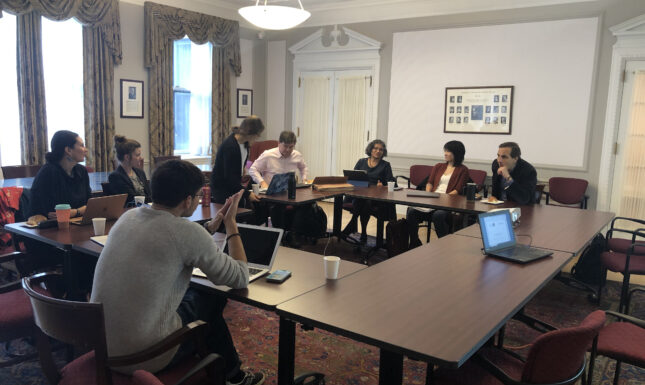Workshop on Human Rights and Contested Agency
There is a lack of understanding of how agency is currently conceptualised and what it actually constitutes in the operationalisation of international human rights instruments. A recent Workshop addressed this issue.
While maximising human agency and freedom is one of the core values of the international human rights project, a subject’s agency is often only recognised when it is considered as the ‘right kind’ by implementers of international human rights norms. The result of this is that many remain on the margins of the human rights praxis. The following sections present the themes that emerged from discussions during the Workshop which was organised by Edward van Daalen of the Centre for Human Rights and Legal Pluralism and Hoko Horii of the Van Vollenhoven Institute.
Molding
When people who do things with their agency which goes against the human rights legal framework, what human rights instruments do is a kind of ‘molding’. Molding is to tell them: ‘You may not be or think of yourself as a free autonomous agent, but this is how we imagine you, and we must move beyond tradition to modernity, to find unconstrained humanity.’ You have to be a subject that the human rights project hypothesises.
Invocations of agency and the ‘need to protect’ the vulnerable are intimately tied to colonial legacies – discourses of rescuing and civilising. Female genital mutilation and the hijab, for instance, are always invoked against a background of culturally foreign practices.
A conflict of values
The recognition of agency becomes difficult when what is advocated for by marginalised groups goes against traditional ideas of ‘progress’. On some level, human rights is a freedom maximising project that is supposed to be minimalistic, but it develops into a pretty thick project that is value-laden.
It is framed as a matter of agency, but the conflict of values is the real problem. Cultural relativism silences us into thinking we can’t say anything because it’s just ‘different’ – here, the discourse of agency is deployed instead. It’s a battle about what the shared morals are.
Paternalism
When we talk about agency as it exists on the margins, there is paternalism. There is a worrying tendency of paternalism under the guise of protecting agency to reintroduce a thick moral conservative agenda.
The impossibility of consent is used as a paternalistic tool. For instance, think about an absolute ban on romantic relationships between professors and students because of power relationships. Such a strict and prohibitionist approach is paternalistic because the less powerful actor in that relationship is basically alienated. They are considered to have no way of making an informed decision.
Defining agency
In the enlightenment model, the progress is to distance ourselves from authority, and to think for ourselves. The ideal of being ‘free/autonomous’ is to be in a perfect condition of information without any kind of power. Based on the idea that we are rational. But such a perfect condition is impossible to achieve. Does the idea of consent only arise when power dynamics are totally stripped? The unrealistic project of pursuing the idealised vision of freedom and autonomy leads to the hyper-legalisation of sexual acts.
There is also a neoliberal angle. When the neoliberal order looks at order through the human lens, which is about organising humans based on market efficiencies. Then there is a focus on children as human capital, and a loss of human capital – which was evident in the discourse of child soldier, for example.
Relationality
We must consider that autonomous decisions are made in a social context. For instance, for some people female genital mutilation is needed in order to be part of their community. Sometimes conceiving rights as relationships helps us to have a better understanding of agency.
One of the participants of the workshop emphasised the importance of recognising collective identity and ‘we-agency’ when trying to understand how social movements overcome internal conflicts. While the ‘I’ perspective is never erased, thinking about the ‘we-agency’ challenges the enlightenment model of moral progress that prescribes exercising autonomous thinking, which remains key to how agency is conceptualised in international human rights law.
Ways forward
What are the alternative ways to conceptualise agency so that it accommodates the diverse and challenging ways that agency exists ‘on the margins’? Here are some ideas that are shared, to be explored.
- Amplifying the voices of those with agency with ‘different’ conceptions of progress.
- Think of ‘agency’ as the link that transforms an abstract ‘human right’ into an actual ‘human capability’.
- A more general account of the relationship between agency and human rights would help the debate. Which types of agency (i.e. social, moral, and political or individual and collective) are relevant to human rights instruments? How is agency distinct from ‘interest’, ‘freedom’ or ‘will’?
- For migration policies, one participant proposes to bank on the agency of migrants to go where they can thrive and find their place in the host society. Capacity to be heard in a public debate and a more direct involvement of the concerned groups in the framing of their rights may increase their agency, and the acceptance of the diversity in the ways they exercise it.
Agency and freedom, however framed, are one of the most fundamental questions that have been addressed in social science and philosophies. Human rights and law is another important place of inquiry on this topic, as law can be a constraint for our freedom. However, there is this belief that law (especially human rights law) should and can be emancipatory. We are deeply excited by this project, and are currently working on a Special Issue on InterGentes, composed of short contributions from each participant of the Workshop.
Report on the Workshop is available here under ‘Other Ongoing Research Projects’.





0 Comments
Add a comment